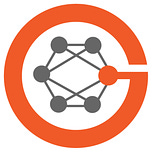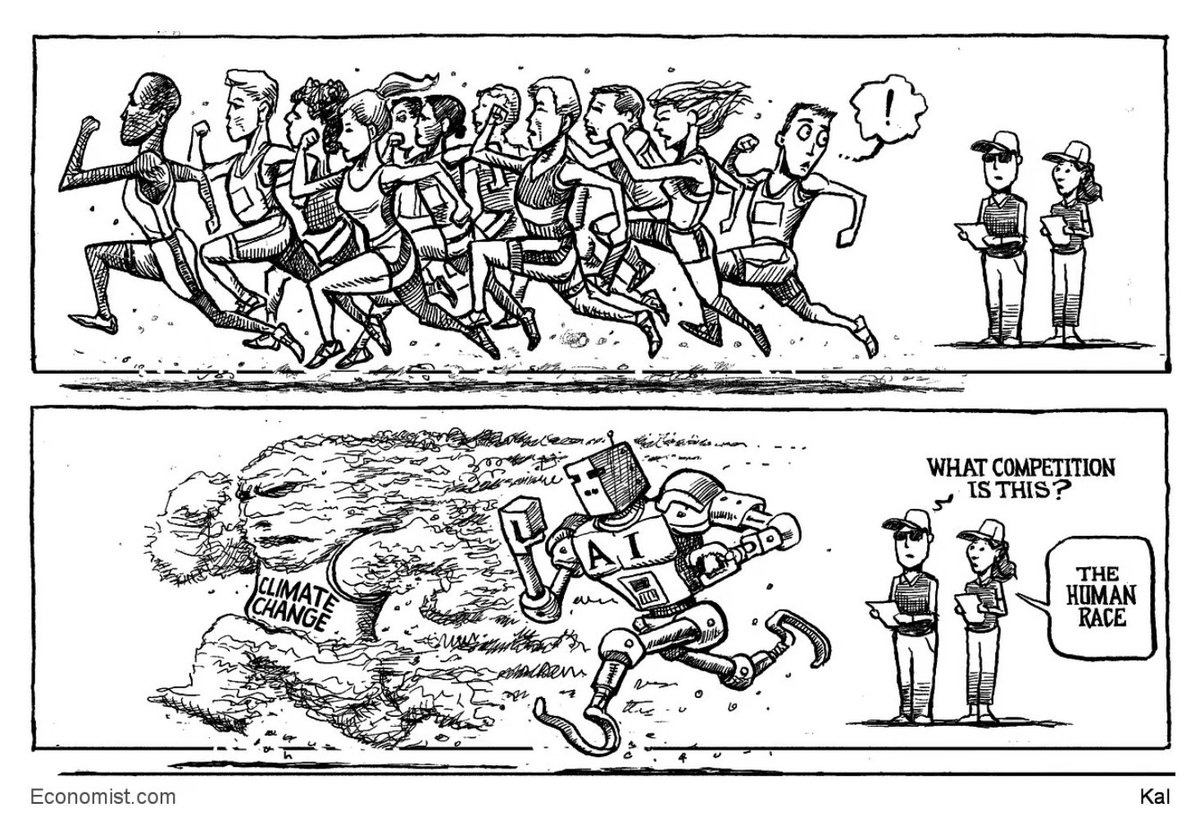Transcript with some hyperlinks
Eric Topol (00:00):
Hello, Eric Topol here. And what a privilege to have as my guest Al Gore, as we discuss things that are considered existential threats. And that includes not just climate change but also recently the concern about A.I. No one has done more on the planet to bring to the fore the concerns about climate change. And many people think that the 2006 film, An Inconvenient Truth, was the beginning, but it goes way back into the 1980s. So, Al it's really great to have you put in perspective. Here we are with the what's going on in Canada with more than 12 million acres of forest fires that are obviously affecting us greatly, no less the surface temperature of the oceans. And so many other signs of this climate change that you had warned us about decades ago are now accelerating. So maybe we could start off out, where are we with climate change and the climate reality?
The Good News on Climate Change
Al Gore (01:00):
Oh, well, first of all, thank you so much for inviting me to be on your podcast again, Eric. It's always a pleasure and especially because you're the host and we, we have very interesting conversations that aren't on the podcast. So, <laugh>, I'm looking forward to this one. So, to start with climate you know, the old cliche, there's good news and bad news. Unfortunately, there's an abundance of bad news but there's also an awful lot of good news. Let me start with that first and then turn to the more worrying trends. We have seen the passage in the US last August of the largest and most effective best funded climate legislation passed by any nation in all of history. The so-called Inflation Reduction Act is an extraordinary piece of legislation.
(01:55):
It's billed as allocating $369 billion to climate solutions. But actually, the heavy lifting in that legislation is done by tax credits, most of which are open-ended and uncapped, and a few without any time limits, most a 10-year duration. And the enthusiastic response to the legislation after President Biden signed it has now made it clear that that early estimate of 369 billion is a low-ball estimate, because Goldman Sachs, for example, is predicting that it will end up allocating 1.2 trillion to climate solutions. A lot of other investors and others using economic models are estimating more than a trillion. So, it's really a fantastic piece of legislation and other nations are beginning to react and respond and copy it. One month after that law was passed the voters of Australia threw out their climate denying government and replaced it with a climate-friendly government, which immediately then set about passing legislation that adopts the same goals as the US IRA and the Australian context.
(03:19):
And they stopped the biggest new coal mine there. And anyway, one month after that, in October, the voters of Brazil threw out their former president often called the “Trump of the Tropics” and replaced him with a new president, a former president who's a new president, who has pledged to protect the Amazon and the European Union in responding to the evil, evil and cruel invasion of Ukraine by Russia. And the attempted blackmail of nations in Europe, dependent on Russian gas and oil responded not by bending their knee to Vladimir Putin, but by saying, wait a minute, this makes renewable energy, freedom, energy. And so they accelerated their transition. And so these are all excellent signs and qualifies as good news. The other good news is not all that new, but it's still continuing to improve.
(04:28):
And that is the astonishing reductions in cost for electricity produced by solar and wind, and the reductions in cost for energy storage, principally in batteries and electric vehicles and a hundred other less well known technologies that are extremely important. We're in the midst of early stages of a sustainability revolution that has the magnitude of the industrial revolution, coupled with the speed of the digital revolution. And we're seeing it all over the place. It’s really quite heartening. One quick example last, the, the biggest single source of global warming pollution is the generation of electricity with gas and coal. Well, last year, if you look at all the new electricity generation capacity installed worldwide 90% of it was renewable. In India, 93% was solar and wind. And India's pledged not to give permits for any new coal burning plants for at least five years, which means never, probably because this cost reduction curve, as I mentioned, is still continuing downward electric vehicles, we're now seeing that the purchases have reached 15% of the market globally.
(05:56):
Norway's already at 50%. They've actually outlawed the sale of any new internal combustion engines. And indeed, many national and even municipal and state jurisdictions have prospectively served notice that they, you won't be able to buy them after a certain day, 2030, in many cases and the auto companies and truck and bus companies have long since diverted their research money all their R & D is going into EVs now. And that's the second largest source of global warming pollution. I could go through the others, but I want, I'll just tell you that there is a lot of good news.
And the Bad News
Now, the bad news is we're still seeing the crisis get worse, faster than we're deploying all of these solutions. And, the inertia in our political and economic systems is partly a direct result of huge amounts of lobbying and campaign contributions and the century old net of political and economic influence built up by the fossil fuel industry.
(07:18):
And they're opposing every single solution at the state level, the local level, the national level, the international level. Now, this COP 28 [the 2023 United Nations Climate Change Conference] coming up at the end of the year in the United Arab Emirates is actually chaired by an oil and gas company CEO-- It's preposterous. And they already have in the last two COPS, more lobbyists registered as participants than all than the five or six largest national delegations combined. And we're seeing them really oppose this change. And meanwhile, the manifestations of the crisis are steadily worsening. You mentioned the fires in Canada that are predicted to burn all summer long. And I was in New York City last week, and you, you know, from the news stories it, it was horrific. I got there the day after the worst day, oh my God.
(08:21):
But I saw and heard from people just the tremendous problems that people have. It's also going on in Siberia, by the way, and these places that are typically beyond the reach of TV crews and networks that don't capture our attention unless something happens to blow the smoke to where we live. And that's what's happened here. But there are many other extremely worrying manifestations that aren't getting much attention. I do think we're going to solve this, Eric. I'm very optimistic, but the question is whether we will solve it in time. We are what's the right way to say this? We're tiptoeing through a minefield with tripwires and toward the edge of a cliff. I don't want to torture the metaphor, but actually there are several extremely dangerous threats to ecological systems that are in a state of balance now, and are being pushed out of their equilibrium state into a different format.
(09:35):
The ocean currents--we're already seeing it with the jet stream in the northern hemisphere. You may have seen on the weather maps. They're now using these a lot where it's getting loopier and more disorganized. That's what the last few winners has, has pulled these big loops, have pulled arctic air down into areas far south in the US and in other regions, by the way. And it’s making a lot of the extreme events worse. Now, we're entering an El Nino phase in the Pacific Ocean comes around every so often, and this one is predicted to be a strong one, and that's going to accentuate the temperature increase. You know, it was [recently] 110 degrees last week in Puerto Rico, 111 degrees in several countries in Southeast Asia.
(10:31):
Last summer, China had a heat wave that the historians say about, which the historians say there's nothing even minimally comparable in all prior known, and the length, the extent, the duration, the intensity. And we saw monsoons lead to much of Pakistan underwater for an extended period of time. I could go on, but the net and balance out the good news and the bad news we are gaining momentum. And soon we are going to be gaining on the crisis itself and start deploying solutions faster than it's getting worse. So I remain optimistic, and I always remind people, if you doubt we have the political will to see this through, remember that political will is itself a renewable resource.
The Intersection of A.I. and Climate Change
Eric Topol (11:27):
Yeah, that's a great optimistic point, and we sure appreciate that, because it's pretty scary to see these trends that you reviewed. Now, as you know recently there was a large group of AI scientists this one led by Sam Altman of OpenAI, who put out a statement, a one-sentence statement, and it said, “Mitigating the risk of distinction from ai, which you and are enthusiastic about, should be a global priority alongside other societal scale risks, such as pandemics and nuclear war.” Well, obviously, also climate change. So how do you see the AI intersection of climate change? Because as you well know, GPT-4, having pre-trained with some 30,000 graphic processing units [GPUs], the issues about consumption of energy carbon emissions, the need for water cooling, is AI going to make this situation worse, or will it make it better?
Al Gore (12:33):
Well, yeah. You know, I understand. Well, both would be my answer. And we don't have enough data yet to really know for sure which way it will tip. Maybe we'll talk about the existential risks from generative AI. As this conversation continues, there are many who have spoken up and said, well, wait a minute, before we focus on that, we need to look at the risks that are right, staring us right in the face. I mean, the use of these AI driven algorithms, not necessarily generative AI, but the AI-driven algorithms in social media are causing tremendous harm right now. You've heard about the rabbit holes that people get drawn down into on the internet. That's because of the AI-driven algorithms and the tracking of confidential information about what people are looking at and what they're interested in.
(13:40):
And these are rabbit holes are ,a little bit not to shift metaphors, a little bit like pitcher plants in that they have slippery slides and, oh, and, you know, what's at the bottom of the rabbit hole? That's where the echo chamber is. And when you spend long enough in the echo chamber, then those who are feeding the information to you weaponize a new form of AI, not artificial intelligence, artificial insanity. And, and we see it all over the place where people are utterly convinced of completely ridiculous and provably false conclusions and, and motivated to go out and act in the real world. On that basis we, we see the fakes and the concerns about video and audio deep fakes, and how that's going to have an impact on us and, and all manner of other concerns that need to need to be addressed.
(14:43):
But the existential threat is one that I do want to come back to. But, turning to your specific focus on whether it is going help or hurt or both where climate is concerned, I have co-founded a coalition called Climate TRACE that uses AI in an extremely effective, beneficial way. Trace stands for tracking real-time atmosphere, carbon emissions, and we have a coalition of AI firms, NGOs, university groups and the whole coalition works together to identify with AI, the point source of every single significant stream of emissions of global warm inclusion everywhere on the planet. We released it at the last United Nations Conference, the one that was held in Egypt last year. The top 72,000 emission point sources around the world this fall; we will release the top 70 million emission sources.
(15:54):
We also have every agricultural field in the world down to a 10 meter by 10 meter resolution. We have all, every single power plant, all the steel mills, every large ship, every large plane, most every well, we have all of the significant greenhouse gas emissions that wouldn't have not, that would not have been possible without ai. Now, this is not generative AI. We have used generative ai --not ChatGPT--we tried that, but there are others that are actually more proficient in the views of our team members at writing code. It has saved us time and enhanced our productivity in writing code. So that's one example where AI has been a big help. And we see it in modeling, and we see it in the preparation for adaptation and in other ways. Now, the downside is, you said in your introductory phrasing that the energy requirements and the emissions are just enormous because it is an extremely energy intensive exercise.
(17:09):
And you have to have the GPUs as well as the energy. So it's you could call it “oligopogenic”-- that may not be a word. It may be a hallucination, like GPT is famous for, but what I mean is it, it does tend to favor a very small number, a very wealthy, very powerful, very large companies. Basically, Google and Microsoft are driving the, the rest of the world to try to desperately catch up. You know, the CEO of Microsoft. They stole a march on Google with the release of ChatGPT and then that fascinated people and the pickup and use of GPT unbelievable is just, it, it's there's been nothing like it in.
(18:19):
Previous technological history. The CEO said that he wanted to make call Google out and make him dance. Well you know, Peggy Noonan said in one of her columns, that's not a responsible way for the CEO of such a company to talk. I, I like him, and I'm not really taking a poke at him, insofar as I'm making the point that there're really two companies, and the internal dynamic between the two is driving this frenzy of investment and activity, and the underlying platform, the large language models, they're all almost a commodity now. They're all over the place and have been for a while. But the need for the GPUs, the need for the energy consumption that's limiting the cutting edge developments to these two companies. For now, China doesn't trust it because they don't trust the enhanced political influence.
(19:22):
It might give those using it or the enhanced insight. And there are others that will try to find a way to use it, of course. But the, the emissions itself are extremely harmful and the use of generative AI in the hands of irresponsible actors. And, unfortunately, we're human beings and we have a lot of irresponsible actors around this, around this country, around the world. And they could use that to really put climate disinformation into high gear. They, they can use it in a variety of ways to further enhance the disruption, the disruptive tactics they've used in the past.
Eric Topol (20:15):
Yeah. Well, that's what I wanted to get into more on this. We have, I think, you know, if you want to put an existential risk at the highest level, maybe if you were assign 10 to climate change and you've brought up the fact that the large language models generative AI will make worse, the things we've already seen, the, the hacking of democracy and all the fake stuff that's the conspiracy theories that it will reinforce. And the question is, where are you, where did you place the whole generative AI era that we've now entered in if you were to weigh it against existential threat, just other, one other thing. You've, you undoubtedly, because you read more than anyone I know you're a true scholar, and you've read these doomsayer essays about hacking a democracy and
(21:11):
the end of the world, and some of the notable leaders in AI like Geoffrey Hinton to leave Google. And so we have, on the one hand some people saying this is a real threat to the world. And then we have Marc Andreesen who wrote, “Why AI Will Save the World” last week , a long read on this. So where do you, where do you see the existential threat of now that AI has gone into high gear, as you noted, more than a billion unique users of ChatGPT within 90 days, which is unprecedented. I mean, with
Al Gore (21:45):
All cap, nothing else is even close in history. Yeah,
Where are we with Artificial General Intelligence?
Eric Topol (21:48):
Yeah. So, do you see that this has been exaggerated, the risk of generative AI? Or how do you compare it to the climate change crisis?
Al Gore (22:01):
Well it's a great question, Eric. And of course lots of people we know are breaking their brains trying to answer that question. I think we need a little more experience with it because our understanding is going to develop as we have more experience. But at the same time, we're trying to catch up in our basic understanding of what the heck's going on with these things. And they don't actually know it's important to note they don't know how it's doing what it's doing. And I'll, I'll circle back to that. But while we're trying to figure it out, it's continuing to advance at warp speed. GPT-4 in the cleverly titled, the provocatively titled, research paper “Sparks of Artificial General Intelligence” that Microsoft put out is already demonstrating capacities that are shockingly comparable to human capacity is the way they put it.
(23:13):
This less than a year after Google fired a young researcher named Blake Lemoine who said that he thought theirs had become sentient. And they fired him right away. These multiple co-authors of this paper from Microsoft weren't fired. They're in charge of the thing, and they're basically saying close to what the guy at Google said, who got fired.I think that if you listen to Geoffrey Hinton, the so-called godfather of generative AI, and there's so many, many parents of generative AI. But what caused him to change his mind, in his words, were when he realized that it is very likely to become much smarter than we are, than the smartest human beings ever are. And coupling that level of superintelligence, the phrase some have used with access to all of the knowledge that humanity has ever compiled means there is an unpredictable unquantifiable risk that we might no longer be the apex lifeform on this planet.
(24:47):
And that generative AI might be used that in ways that would be threatening to us. I think we need more experience with it in before we decide, okay, that's it. We not going to unplug all these dang things and bust them up with sledgehammers. That's not going to happen. Cause there's so many different entities pursuing it. But, you know, I placed this the context of one of the themes in that runs through the history of science, Eric. And that is, as we have seen in the past, new discoveries that have challenged our human understanding of our place in creation. For example, when Galileo said, the Earth's not the center of the universe, it's not the center of the solar system, the church said ah, off to prison with you, they put him on trial.
(25:58):
because that challenge our prime place in what we had thought was God's design. Then Darwin, of course, placed us solidly in the animal kingdom, descended from, from primates and apes and monkeys. And of course, that struggle is still, I used to represent Dayton, Tennessee and the United States House of Representatives where, where the, the Scopes Trial took place, the so-called monkey trial. And there have been a succession of other similar blows to the collective ego of humanity. We used to assume confidently that the earth was probably the only place in the whole universe that life where life emerged. And now the common assumption is it's ubiquitous throughout the universe and maybe in advanced forms and lots and lots of places. And by the way, the universe isn't the only universe they tell us.
(26:55):
Now, the emerging better view is that we're in a multiverse, and that's all above my pay grade. But within that, within that continuum of successive blows to the collective ego of humanity, here comes an assertion that something other than a human being may be conscious. And our immediate reaction, as it, as our predecessors' reactions were with Galileo and Darwin, et cetera, nah, that can't be we're special. No, it can't be. We're the only ones. Well maybe not. They are edging closer and closer to a point where scientists and engineers are likely to say, yep, it is conscious. Maybe it won't happen. I kind of think it is already beginning to happen. I think there's an explanation for it, but we're going to have to catch up to that explanation. And we're going have to build this airplane of regulation and safeguards while we taxi it out to the runway.
Can AI Help Solve the Climate Crisis?
Eric Topol (28:06):
Well, you know, I share that view. You know, I don't think that continuing to say this is just a stochastic parrot is where we're at right now. It's a form of intelligence from machines that we haven't seen previously. And as you've really zoomed in on this is the big debate about the level of understanding the so-called “world model.” And, you know, this is something that is only going to get more capable over time. And that gets me to kind of close the loop on our discussion. Do you foresee that we could get to a point where our machine help would come up with new solutions? I mean, as you've summarized, you have phenomenal AI tracking of climate change, but could you foresee that there are potential solutions that we haven't thought of, that, that generative AI could help us as humans to solve the climate crisis?
Al Gore (29:05):
Yeah, I think that's very likely. You know, one of the new professions that's just emerged as a, a prompt engineer—
we'll have to have people trained in prompting these large language models in a way that gets us to the kinds of exchanges you're talking about. But we've, even before generative AI arrived, we have had multiple examples of artificial intelligence solving problems that we humans have not been able to solve. One example that I wrote about several years ago was the long-term effort to try to decode the genetics of a little thing called the planarian worm. It's been of extreme interest because it can regenerate every part of its body. And in, in such an efficient way they've been trying to understand it.
(30:07):
So a group of scientists took all of the raw data from all of the failed experiments collected during all of the failed experiments to try to solve that problem, fed 'em into an AI. And the AI said, okay, here's the answer. And it was credited. The AI agent was credited as one of the co-authors of the resulting study. We've had we've had problems in fluid dynamics solved by artificial intelligence that were impenetrable to us. So there's no question in my mind that some of the solutions that we're looking for, for the climate crisis will be found with the assistance of generative AI. I'm certain of that.
Eric Topol (30:53):
Well, that adds to the optimism that we want to close up with because we need that in the face of what we're seeing that's palpable every day regarding climate change. And, you know, I think this discussion, Al, I could spend the whole day with you because it's so stimulating and your ability to cite history, as well as current and future perspective is, for me, unparalleled. So, I really enjoyed this discussion with you, and I hope we'll have another one real soon, because this generative AI era is zooming, like I've never seen ChatGPT in November, GPT-4 in March, and you know what's next here.
Al Gore (31:35):
So GPT-5 is coming in December, as you said. And, before you conclude, Eric, let, let me just give back to you my admiration for the work that you've been doing on the applications of generative AI in healthcare and the development of even better healthcare technologies. You're the leading exponent of this whole field of knowledge now. And you know, you helped us get through the, our effort to understand the pandemic and all the twists and turns and all of that. And now you're taking the lead on the application of AI in healthcare, and thank you very much. I speak for a lot of people in saying that.
Eric Topol(32:19):
Well, that's really kind to you. That's, that's where my interest was before the pandemic. And now the good part is to be able to get back to it full force. But I do think, unlike the overall existential concerns regarding AI and the large language models of AI, the net benefit for healthcare is just much more obvious. Yes, there are concerns, of course, regarding patient prompts and getting inaccurate responses. However, what it can do for the, the medical community and for patient autonomy is, is really quite extraordinary. So, in that regard another good way to, to sum up our, our discussion here because that's a very, I'm very sanguine about, as we get better about implementing AI in healthcare, it'll make a big difference particularly now with this multimodal AI that brings in images, the records, you all the data that voice, you know, the ambient voice of office visits, as well as even bedside rounds. It's really quite exciting. And I know we're going be talking about that some more in the months ahead. So thank you so much. You've, you've brightened up this day because all I keep seeing are these apocalyptic photos of New York and what's going on out there, graphs of the oceans sea surface temperature. And I'm thinking, oh my, how we keep losing ground on what you told us about for decades. And I like hearing that you think these solutions are and be increasingly to catch up to that. So thank you.
Al Gore (33:59):
Thank you, Eric.












